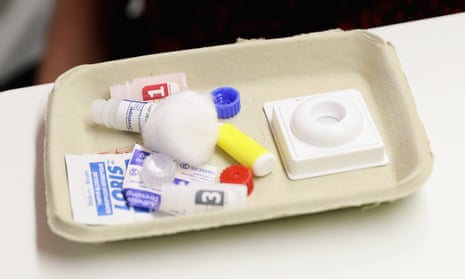The UK has hit a significant UN target on the way to ending the HIV epidemic by succeeding in diagnosing and effectively treating more than 90% of people with the virus.
Public Health England said there were an estimated 102,000 people with HIV in the UK last year, of whom 8% – 8,200 – were believed to be unaware of their infection.
UNAids has set a “90-90-90” target for every country, challenging health authorities to diagnose more than 90% of people with HIV, put 90% on treatment and ensure 90% experience viral suppression, meaning the amount of HIV in their body being kept so low by antiretroviral drugs they are not infectious to others.
In July UNAids said Botswana, Cambodia, Denmark, Swaziland, Namibia and the Netherlands had reached the 90–90–90 targets and seven more countries were on track to get there.
The UK has now joined their ranks, PHE announced, with 92% diagnosed, 98% of those diagnosed on treatment and 97% on treatment virally suppressed.
A PHE report published before World Aids Day on Saturday says new diagnoses have continued to fall, from 5,280 in 2016 to 4,363 in 2017. Notably, transmission among gay and bisexual men had been declining since 2012.
Campaigners will hail the availability of PreP – pre-exposure prophylaxis – as an important factor, although it is not the only one. PreP is an antiretroviral drug that can be taken daily by those who are at risk because, for instance, they have a partner who is HIV-positive. It has been shown to reduce their chance of infection by more than 90%.
HIV advocacy organisations took the NHS to court over its refusal to pay for PreP and won in 2016. The NHS had estimated the drug would cost £20m a year. As a result, PreP was offered to 10,000 men in a trial.
The PHE report says use of PreP may be one of the reasons for declining infections, but the effect cannot be quantified yet. The study points to a package of measures including condom use, increased testing, especially at sexual health clinics, and those diagnosed being put on drug treatment faster.
“There can be no doubt prevention efforts to end the HIV epidemic in the UK are working,” said Noel Gill, head of STIs and HIV at PHE. “Our efforts must continue apace in order to eliminate HIV. With an estimated 8,000 people still unaware of their infection it is vital that people seek out an HIV test if they consider themselves at risk, or accept the offer of an HIV test by a healthcare professional, as early diagnosis is key to stopping transmission.”
The health and social care secretary, Matt Hancock, recalled the time when an HIV-positive diagnosis was “effectively a death sentence”.
He said: “Today’s report is a poignant and powerful reminder of how far we’ve come. Now in the UK, almost everyone with HIV is not only diagnosed and in treatment but living long, healthy, lives – and we’re one of just a handful of countries to meet these ambitious UN targets.
“This didn’t seem possible just a few decades ago but thanks to the efforts of public health bodies, charities and the NHS to encourage early testing and pioneer high-quality treatment, we are pushing ahead in the fight against HIV.”
However, there is still great concern about the 43% of people who are diagnosed late, which means they could be sick and could have infected other people before realising their own HIV status.
Deborah Gold, chief executive of the National Aids Trust, said the group was overjoyed that all the efforts had paid off so spectacularly. “This is an extraordinary moment in the fight against HIV, in which everything seems possible. We know what works. We have the tools. With the right political will, investment and public support, we can eliminate HIV as a public health threat and make real progress towards the UN target to end HIV-related stigma.”
Ian Green, chief executive of the Terrence Higgins Trust, said it was fantastic news. “But this is far from the end and it’s time for us to be even more ambitious as we work towards ending new HIV transmissions entirely in the UK,” he said. He called for the government to commit to ending new infections by 2030.
The Local Government Association also applauded the news but called for the reversal of £600m of cuts to councils’ public health grants, which fund sexual health services.
